Agility and scalability reign supreme in the fiercely competitive realm of financial technology. Fintech applications, tasked with handling sensitive data and navigating intricate regulatory landscapes require a robust foundation to thrive. This is where DevOps in fintech emerges as a game-changer, fostering a culture of continuous improvement and rapid innovation.
This comprehensive blog delves into the intricate relationship between DevOps and the scaling of fintech applications, providing actionable insights for startup owners, CXOs, and developers aiming for sustained growth in the US and Canadian markets.
Understanding the Multifaceted Fintech Scaling Challenge: Beyond Simple Growth
Scaling fintech applications isn't merely about handling more users; it involves navigating a complex web of technical, regulatory, and security considerations.
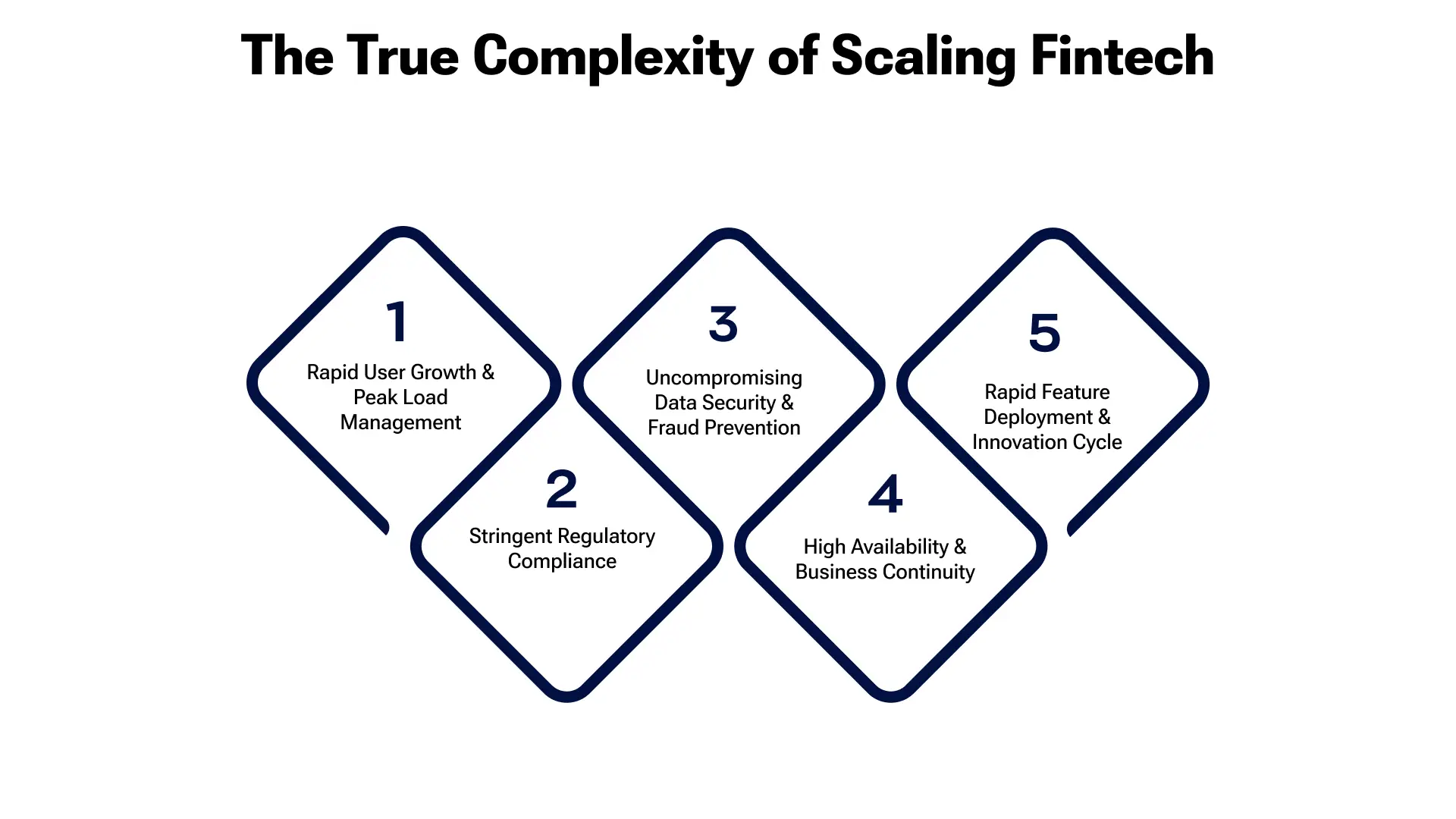 Rapid User Growth & Peak Load Management:
Rapid User Growth & Peak Load Management:
- Fintech apps can experience sudden surges in user activity due to market events, viral campaigns, or seasonal trends. Traditional infrastructure often struggles to cope with these spikes, leading to performance degradation and downtime.
- Effective scaling involves implementing elastic infrastructure, load balancing, and caching strategies to ensure seamless performance even during peak loads.
Stringent Regulatory Compliance (GDPR, CCPA, etc.):
- Financial regulations like GDPR, CCPA, and industry-specific standards demand rigorous data protection and audit trails.
- Scaling must incorporate compliance-as-code and automated audit mechanisms to ensure growth doesn't compromise regulatory adherence.
Uncompromising Data Security & Fraud Prevention:
- Fintech applications handle highly sensitive financial data, making them prime cyberattack targets.
- Scaling must prioritize security, incorporating advanced encryption, intrusion detection, and fraud prevention measures.
High Availability & Business Continuity:
- Users expect 24/7 access to financial services, demanding near-zero downtime.
- Implementing redundant infrastructure, automated failover mechanisms, and robust disaster recovery plans is essential for ensuring business continuity.
Rapid Feature Deployment & Innovation Cycle:
- The fintech landscape constantly evolves, requiring rapid feature development and deployment to stay competitive.
- Scaling must support agile development practices and continuous delivery pipelines for quick iteration and innovation.
The Transformative Power of DevOps in Fintech: A Strategic Imperative
DevOps for financial services transcends mere tool implementation; it's a cultural shift that promotes collaboration, automation, and continuous improvement.
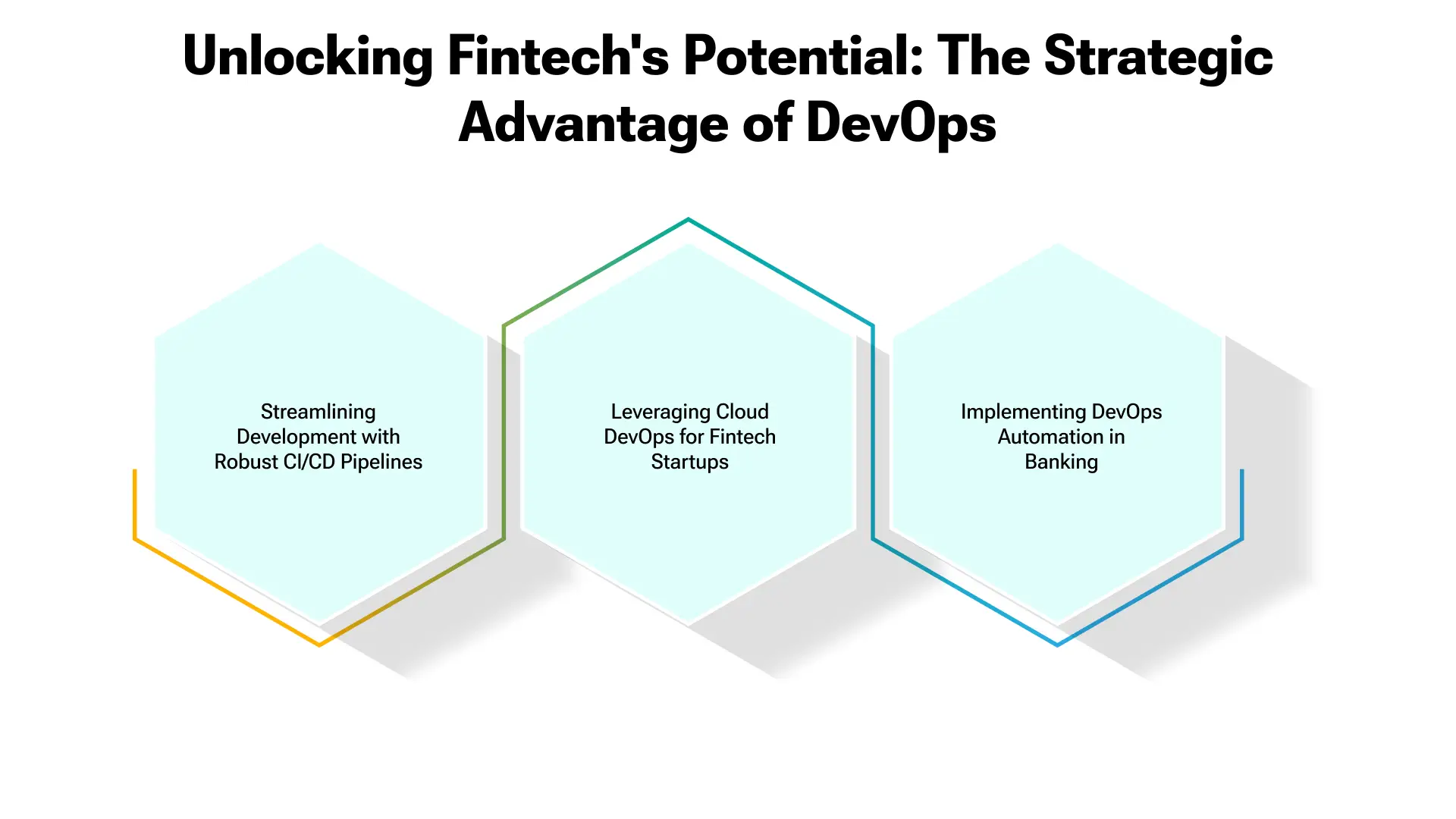
1. Streamlining Development with Robust CI/CD Pipelines in Fintech:
- Continuous Integration (CI): Automated code merging and testing ensure seamless integration of new code with the existing codebase. Early bug detection and integration issue resolution reduce the risk of deployment failures.
- Continuous Deployment (CD): Automated deployment of tested code to production enables rapid release cycles. Infrastructure as Code (IaC) ensures version-controlled and automated changes. CI/CD pipelines in fintech must be audited for security.
- Automated Testing & Quality Assurance: Comprehensive test suites, including unit, integration, and end-to-end tests, ensure code quality and reliability. Automated performance testing identifies bottlenecks and verifies the application’s ability to handle expected loads.
2. Leveraging Cloud DevOps for Fintech Startups: Agility and Cost-Effectiveness:
- Elastic Infrastructure & On-Demand Resources: Cloud platforms provide on-demand resources, enabling startups to scale their infrastructure dynamically based on demand. Pay-as-you-go pricing models reduce upfront investments and optimize costs.
- Serverless Computing & Microservices: Serverless architectures allow developers to focus on writing code without managing infrastructure. Microservices architecture in fintech breaks down applications into more minor, independent services, improving scalability and resilience.
- Automated Infrastructure Provisioning & Management: Cloud DevOps Automation automates infrastructure provisioning, configuration, and management, reducing manual effort and errors. IaC tools like Terraform and CloudFormation enable consistent and repeatable infrastructure deployments.
3. Implementing DevOps Automation in Banking: Security and Compliance Automation
Automated Compliance Checks & Audits
Compliance-as-code automates regulatory compliance checks, ensuring infrastructure and applications adhere to industry standards. Automated audit trails provide a transparent record of all changes, facilitating regulatory audits.
Automated Security Scanning & Vulnerability Management
Automated security scanning tools identify vulnerabilities and security risks early in the development lifecycle. Automated patch management ensures that systems are up-to-date with the latest security patches.
Automated Incident Response & Remediation
Automated monitoring and alerting systems detect anomalies and trigger automated incident response workflows. DevOps automation in banking should be highly audited.
Automated Data Backup & Recovery
Automated data backup and recovery processes ensure data integrity and availability during a disaster.
Best DevOps Strategies for Financial Software Development
Financial software development demands a unique blend of agility and unwavering security. Adopting DevOps tools isn't enough in a landscape defined by stringent regulations and hyper-sensitive data. We need a strategic, tailored approach. Here’s how to build a robust DevOps framework that empowers rapid innovation without compromising security or compliance.
1. Security as a First Principle: Integrating DevSecOps from the Ground Up
- Beyond Shift-Left: It's not just about moving security earlier; it's about embedding it into the developer's mindset. Implement automated security scans and vulnerability assessments directly within the CI/CD pipeline, providing real-time feedback to developers.
- Threat Modeling & Code Analysis: Proactively identify potential security vulnerabilities with threat modeling exercises and static/dynamic code analysis. Integrate security into code reviews, ensuring every change is scrutinized for possible risks.
- Compliance as Code: Automate regulatory checks (PCI DSS, GDPR, etc.) within the pipeline. Policy-as-code tools ensure that infrastructure and application configurations adhere to compliance requirements, creating an auditable and consistent environment.
2. Infrastructure as Code (IaC) with a Security-First Mindset
- Immutable Infrastructure: Treat infrastructure as code, version-controlled, and unchangeable. This ensures consistency and reduces the risk of configuration drift, a significant security vulnerability.
- Automated Security Patching: Automate the deployment of security patches to minimize vulnerabilities. Use configuration management tools to enforce security baselines and ensure consistent configurations across all environments.
- Secure Secrets Management: Implement robust secrets management solutions to protect sensitive credentials. Avoid storing secrets in code or configuration files.
3. Continuous Monitoring & Observability for Proactive Risk Management
- Real-Time Security Monitoring: Implement security information and event management (SIEM) systems to detect and respond to security threats in real time. Correlate security events with application performance metrics for holistic visibility.
- Automated Anomaly Detection: Leverage AI/ML to detect unusual patterns and anomalies that may indicate security breaches or performance issues. Implement automated alerts and incident response workflows.
- Audit Logging & Traceability: Maintain detailed audit logs for all infrastructure and application changes. Ensure complete traceability for regulatory compliance and incident investigations.
4. Fostering a Culture of Collaboration and Continuous Improvement
- Cross-Functional Security Teams: Integrate security experts into development and operations teams. Promote a shared responsibility for security and compliance.
- Regular Security Training: Conduct regular security training for developers and operations teams. Emphasize the importance of security best practices and compliance requirements.
- Post-Incident Reviews: Conduct thorough post-incident reviews to identify root causes and implement corrective actions. Share learnings across teams to prevent future incidents.
5. Data Governance and Security in the CI/CD Pipeline
- Data Masking and Encryption: Implement data masking and encryption techniques to protect sensitive data in development and testing environments.
- Automated Data Validation: Integrate automated data validation checks into the CI/CD pipeline to ensure data integrity and compliance.
- Access Control and Least Privilege: Enforce strict access control policies and the principle of least privilege: Automate access provisioning and de-provisioning.
By implementing these strategies, financial software developers can build a secure and agile DevOps framework that fosters innovation while mitigating risks and ensuring compliance. This approach is not just about tools; it's about creating a culture where security and agility are interwoven into the fabric of the development process.
The Impact of DevOps on Fintech Security and Compliance
In the hyper-regulated and trust-dependent realm of fintech, security, and compliance are not afterthoughts; they are the bedrock of success. DevSecOps transforms security from a reactive measure to a proactive, integrated part of the development lifecycle when implemented strategically.
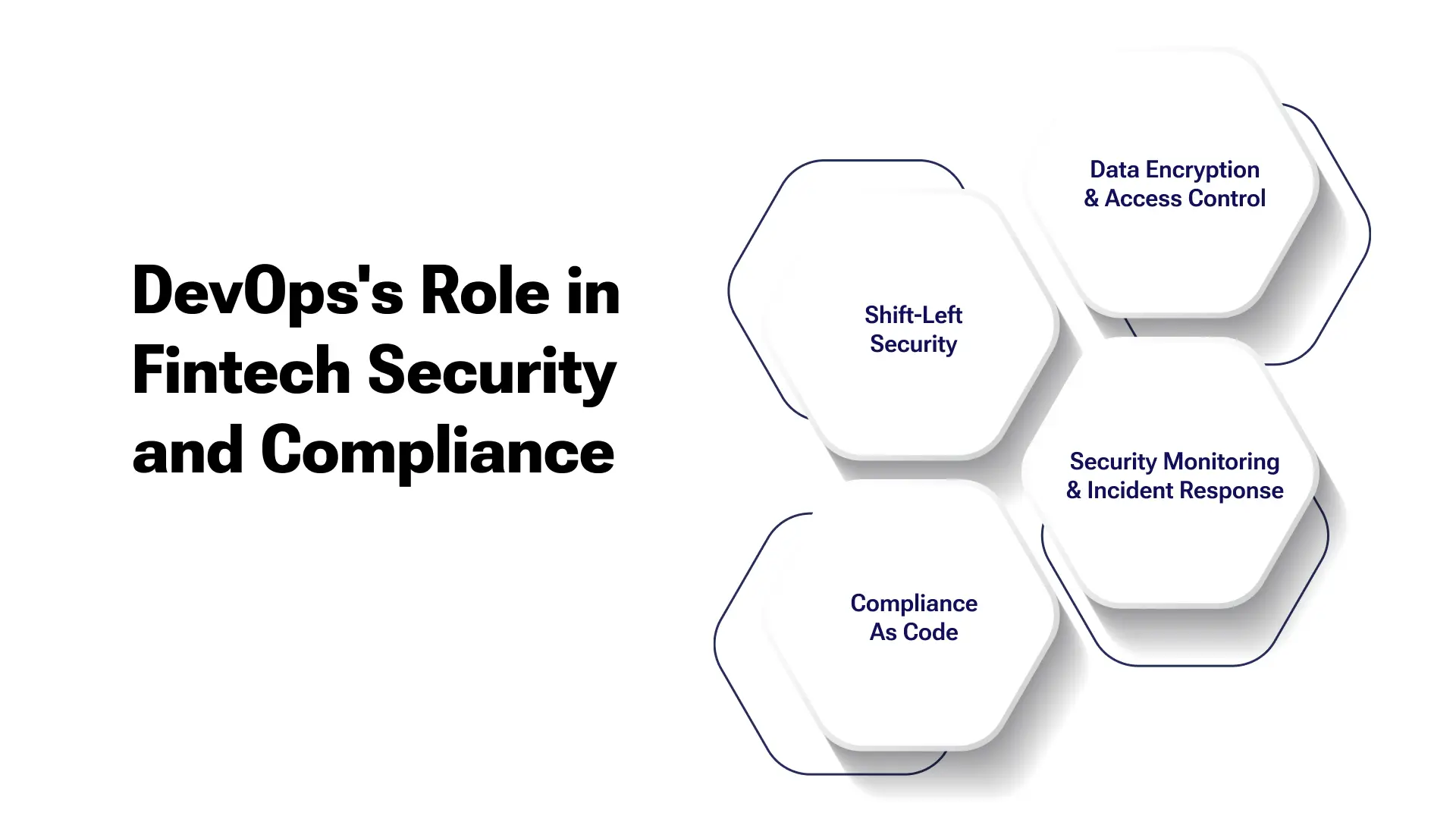 Shift-Left Security: Empowering Developers as Security Guardians:
Shift-Left Security: Empowering Developers as Security Guardians:
- Move beyond basic security scans. Integrate interactive application security testing (IAST) and static application security testing (SAST) directly into the developer's IDE and CI/CD pipeline.
- Cultivate a security-first culture through regular training on secure coding practices, threat modeling, and common attack vectors specific to financial systems (e.g., API vulnerabilities and data injection). Provide developers with tools like security linters and automated security code analysis.
Compliance as Code: Automating Regulatory Adherence:
- Translate regulatory requirements (PCI DSS, GDPR, CCPA, etc.) into executable code using policy-as-code tools (e.g., Open Policy Agent). Automate compliance checks throughout the CI/CD pipeline to ensure continuous adherence.
- Create auditable compliance dashboards that provide real-time visibility into the compliance status of infrastructure and applications. Implement automated audit trails for all configuration changes and data access.
Security Monitoring & Incident Response: Real-Time Threat Detection and Mitigation:
- Implement advanced security information and event management (SIEM) systems with machine learning capabilities to detect anomalies and identify sophisticated attacks.
- Automate incident response workflows using security orchestration, automation, and response (SOAR) platforms. Integrate threat intelligence feeds to identify and block malicious activity proactively.
- Build security into the application's monitoring so that if a security event occurs, it can be seen in real-time.
Data Encryption & Access Control: Protecting the Crown Jewels:
- Implement end-to-end encryption for sensitive financial data in transit and at rest. Secure encryption keys using key management systems (KMS).
- Enforce granular access control policies based on the principle of least privilege. Implement multi-factor authentication (MFA) and role-based access control (RBAC) to restrict access to sensitive resources.
- Data loss prevention strategies should be implemented and automated.
Implementing DevOps for High-Performance Fintech Solutions
Fintech applications demand exceptional performance and reliability. Users expect instant transactions and uninterrupted service. DevOps plays a crucial role in optimizing performance and ensuring high availability.
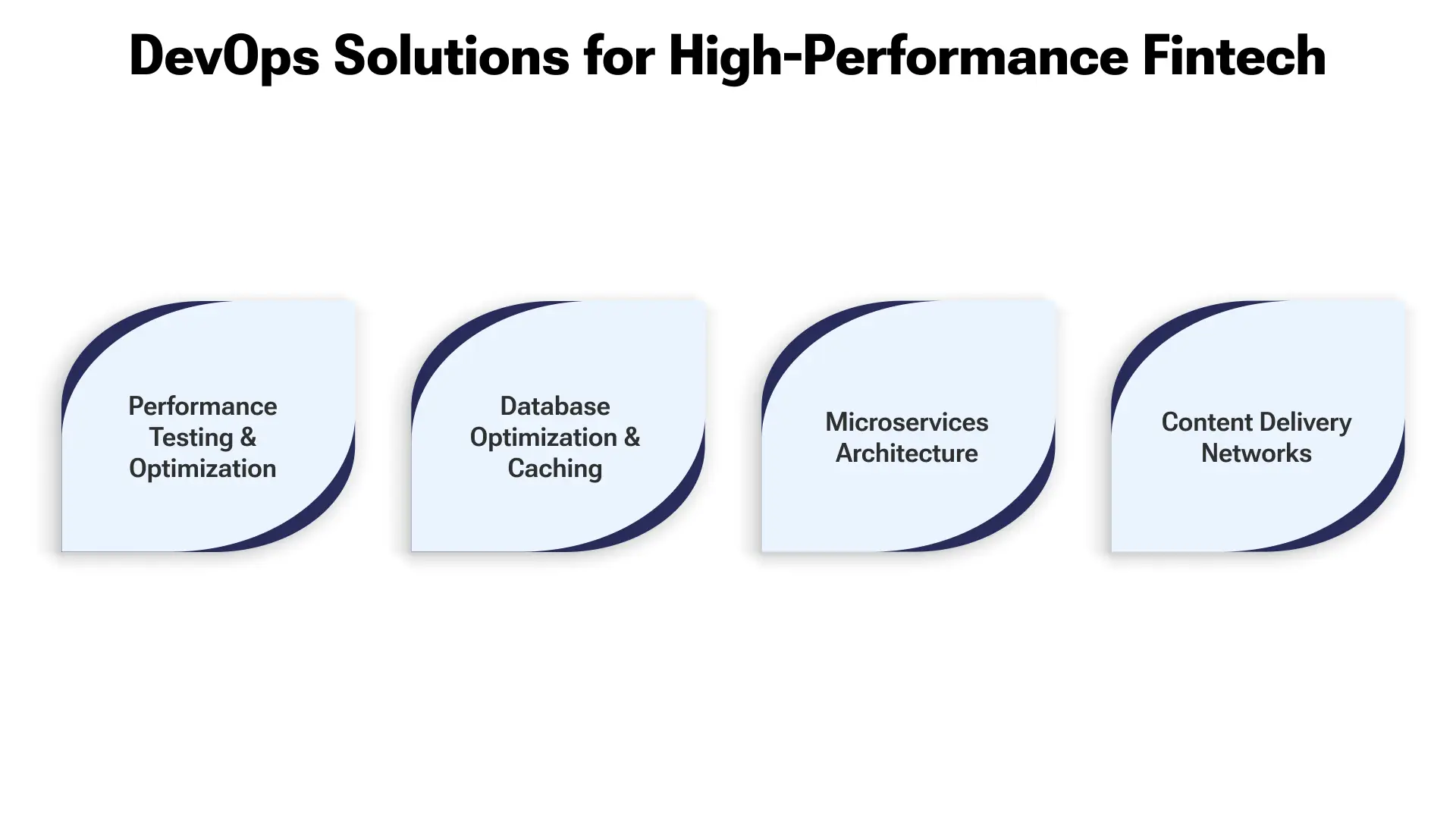 Performance Testing & Optimization: Simulating Real-World Demands:
Performance Testing & Optimization: Simulating Real-World Demands:
- Conduct rigorous performance testing, including load testing, stress testing, and soak testing, to simulate peak loads and identify performance bottlenecks.
- Utilize advanced performance monitoring tools to analyze application performance in real time. Implement automated performance regression testing to prevent performance degradation.
- Implement Synthetic monitoring to find issues proactively.
Database Optimization & Caching: Minimizing Latency and Maximizing Throughput:
- Optimize database performance through query optimization, indexing, and partitioning. Implement in-memory caching solutions (e.g., Redis, Memcached) to reduce database load and improve response times.
- Database connection pooling and load balancing distribute database traffic and prevent bottlenecks. Implement database replication and failover mechanisms to ensure high availability.
Microservices Architecture: Building for Scalability and Resilience:
- Design applications using a microservices architecture, breaking down large applications into more minor, independent services that can be scaled independently.
- Implement service discovery and orchestration tools (e.g., Kubernetes) to manage and scale microservices. Utilize API gateways and service meshes to manage inter-service communication.
- Ensure each microservice has a database to enhance performance and reduce data collisions.
Content Delivery Networks (CDNs): Delivering a Seamless User Experience:
- Implement CDNs to deliver static content (e.g., images, videos, JavaScript) closer to users, reducing latency and improving page load times.
- Utilize CDN caching and compression to optimize content delivery. Implement CDN failover mechanisms to ensure high availability.
- Use CDNs that are optimized for financial data.

DevOps Tools and Technologies for Scalable Fintech Applications
In fintech's fast-paced and highly regulated world, the right tools are crucial for achieving scalability, security, and compliance. Here's a breakdown of essential technologies and their strategic applications:
Containerization (Docker & Kubernetes): Orchestrating Secure and Consistent Deployments:
Leverage Docker to package applications and dependencies into isolated containers, ensuring consistent runtime environments across development, testing, and production.
Utilize Kubernetes for robust container orchestration, automating deployment, scaling, and managing containerized applications. Implement network policies and security contexts to enforce granular access control and isolate sensitive workloads.
Infrastructure as Code (Terraform & CloudFormation): Automating Secure and Auditable Infrastructure:
Employ Terraform or CloudFormation to define and manage infrastructure as code, enabling repeatable, version-controlled, and auditable deployments. Implement security best practices within your IaC templates, such as least privilege access and encrypted storage.
Automate infrastructure provisioning and configuration, reducing manual errors and ensuring compliance with regulatory requirements.
CI/CD (Jenkins, GitLab CI, CircleCI): Enforcing Security and Compliance in Automated Pipelines:
Implement robust CI/CD pipelines to automate the build, test, and deployment processes. Integrate security scanning tools (SAST, DAST) and compliance checks directly into the pipeline.
Use tools with strong audit logging capabilities to track all changes and deployments. Implement role-based access control to restrict access to sensitive pipeline configurations.
Monitoring (Prometheus, Grafana, ELK Stack): Real-Time Visibility for Security and Performance:
In real time, use Prometheus and Grafana to monitor application performance, infrastructure health, and security metrics. Implement automated alerts to detect anomalies and potential security threats.
Employ the ELK Stack (Elasticsearch, Logstash, Kibana) for centralized logging and analysis. Ensure all logs are securely stored and provide comprehensive audit trails for compliance purposes.
Configuration Management (Ansible, Chef, Puppet): Ensuring Consistent and Secure Configurations:
Automate server and application configuration management to enforce consistent security baselines and compliance requirements. Use configuration management tools to automate the deployment of security patches and updates.
Partner with a DevOps Consulting Service to select the best tool for your business.
How DevOps Drives Efficient Scaling in Fintech
DevOps transforms how fintech applications scale, enabling rapid growth while maintaining security and reliability. Here's how:
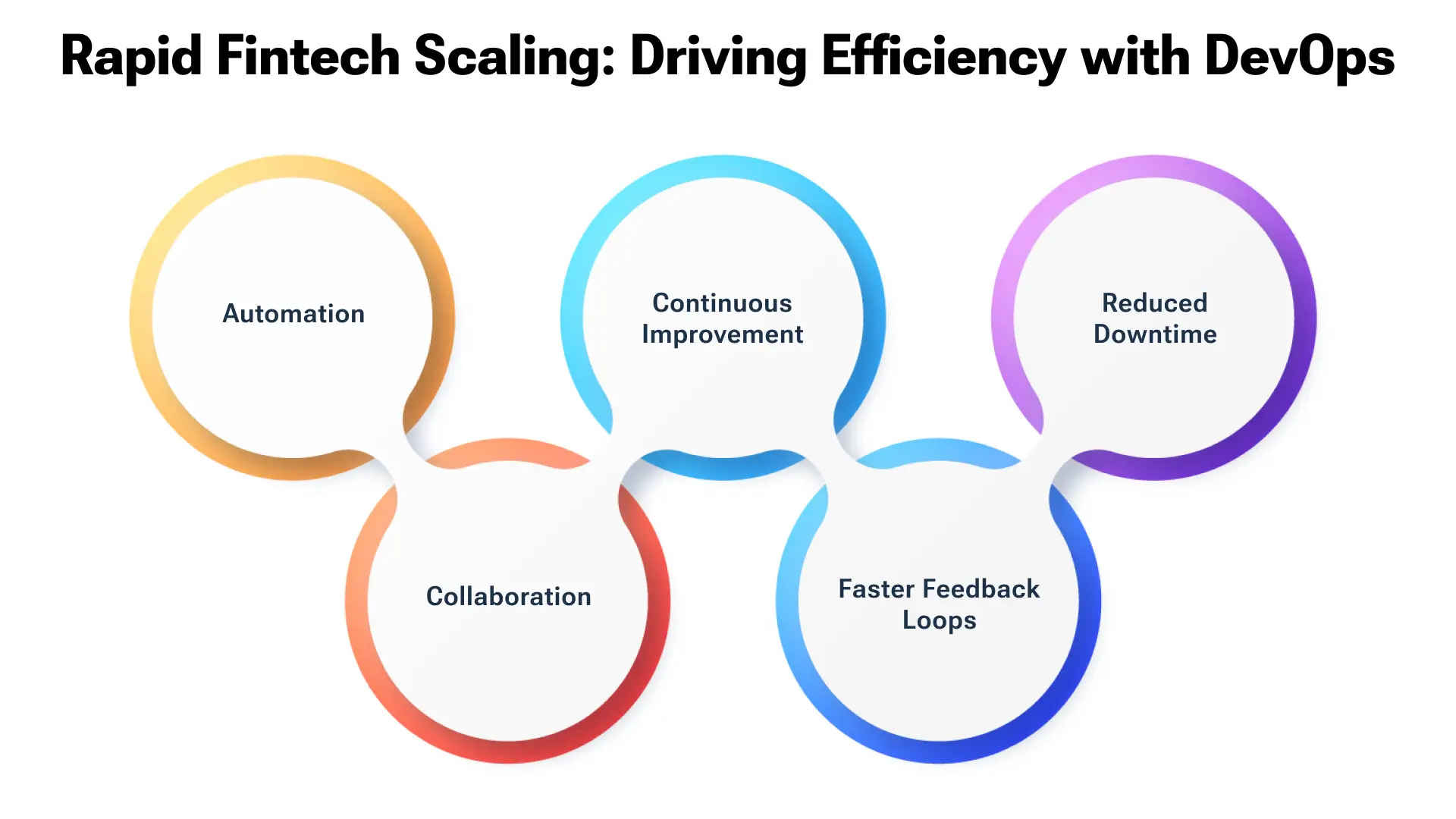
Automation: Eliminating Bottlenecks and Accelerating Innovation:
Automating repetitive tasks like infrastructure provisioning, testing, and deployment frees developers to focus on innovation and feature development.
Automated compliance checks and security scans to ensure that scaling efforts do not compromise regulatory requirements.
Collaboration: Breaking Down Silos and Fostering Shared Responsibility:
Foster a culture of collaboration between development, operations, and security teams, promoting shared responsibility for application performance and security.
Improve communication and knowledge sharing through collaboration tools and practices, such as code reviews and knowledge repositories.
Continuous Improvement: Optimizing Processes for Scalability and Reliability:
Embrace a culture of continuous improvement, constantly seeking ways to optimize processes, improve performance, and enhance security.
Implement feedback loops to gather insights from monitoring and testing, enabling rapid iteration and optimization.
Faster Feedback Loops: Minimizing Risk and Accelerating Time-to-Market:
Implement continuous monitoring and feedback mechanisms to identify and resolve issues quickly, reducing downtime and minimizing the impact of failures.
Automated testing and deployment processes to accelerate time-to-market for new features and updates.
Reduced Downtime: Ensuring High Availability and Business Continuity:
Automate deployment and monitoring to minimize downtime and ensure high availability, which is crucial for maintaining user trust and business continuity.
Automated rollback procedures in case of faulty deployments.
Agile and DevOps Synergy: A Powerful Combination
Iterative Development:
Agile methodologies promote iterative development, enabling rapid feedback and adaptation to change requirements. DevOps supports agile by automating the deployment and delivery of incremental updates.
Cross-Functional Teams:
Agile and DevOps promote cross-functional teams, breaking down silos and improving collaboration. Enable developers, operations, and security teams to work together seamlessly.
Rapid Feedback Cycles:
Agile and DevOps emphasize rapid feedback cycles, enabling teams to identify and address issues quickly. Improve the speed and efficiency of software development and delivery.
Improved Alignment:
Agile and DevOps improve alignment between development and business goals, ensuring that software development efforts are aligned with business priorities. Agile and DevOps synergy improves overall efficiency.
Driving Success with DevOps: Practical Implementation
To effectively implement DevOps in a fintech environment, consider these actionable steps:
- Conduct a DevOps Assessment: Evaluate your current development and operations processes to identify areas for improvement.
- Build a DevOps Culture: Foster a culture of collaboration, communication, and continuous improvement.
- Invest in Automation Tools: Select and implement appropriate automation tools for CI/CD, infrastructure management, and security.
- Implement DevSecOps Practices: Integrate security into every stage of the development lifecycle.
- Prioritize Continuous Monitoring: Implement robust monitoring and logging systems to track application performance and security.
- Provide Training and Education: Invest in training and education to ensure your team has the skills and knowledge to implement DevOps practices.
- Partner with a DevOps Consulting Service: Consider partnering with a DevOps consulting service to accelerate your DevOps transformation.
Key Takeaways for Fintech Leaders:
- DevOps is not just a technology; it's a strategic imperative for scaling fintech applications.
- Cloud DevOps automation, collaboration, and continuous improvement are the cornerstones of successful DevOps implementations.
- Security and compliance must be integrated into every aspect of the DevOps lifecycle.
- Cloud-native architectures and microservices enable greater scalability and agility.
Scaling fintech applications requires a strong devops strategy.
VLink: Your Trusted DevOps Partner for Fintech Scaling
VLink offers specialized DevOps consulting services for the fintech sector, addressing the unique challenges of scaling fintech applications. Our expertise spans regulatory compliance, security, and performance optimization, ensuring your applications are both robust and compliant.
We excel at implementing CI/CD pipelines in fintech, leveraging Cloud DevOps for startups, and ensuring DevSecOps in fintech is integrated throughout your development process. Our deep understanding of DevOps for financial services and proficiency in modern technologies like microservices and containerization enable us to deliver tailored solutions.
We prioritize automation and collaboration, adhering to DevOps best practices for fintech to accelerate your growth. Partner with VLink to navigate the complexities of fintech development and achieve scalable, secure, and efficient applications.
Conclusion: Embracing the Future of Fintech with DevOps
The ability to rapidly innovate and scale is paramount in fintech's dynamic and highly regulated world. DevOps provides the framework and tools to achieve this, enabling fintech companies to deliver secure, reliable, high-performance applications. Fintech businesses can unlock their full potential by embracing DevOps principles and practices, driving innovation, and achieving sustainable growth in the competitive US and Canadian markets.
The application of DevOps for financial services is a competitive advantage. If you want to scale your FinTech application efficiently, securely, and reliably, our DevOps experts can help. We provide comprehensive DevOps consulting services tailored to the unique needs of the financial industry. From implementing robust CI/CD pipelines to optimizing your cloud infrastructure and ensuring regulatory compliance, we have the expertise to guide you through your DevOps transformation.
Contact us today to discuss your needs and discover how we can help you achieve your scaling goals. Let us be your partner in navigating fintech development's complexities and driving sustainable growth.









 Shivisha Patel
Shivisha Patel

















